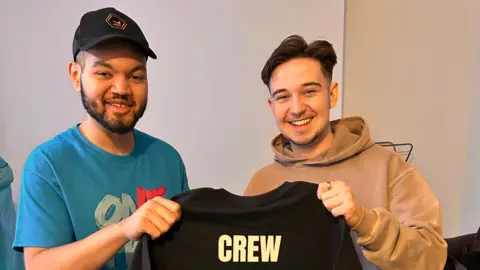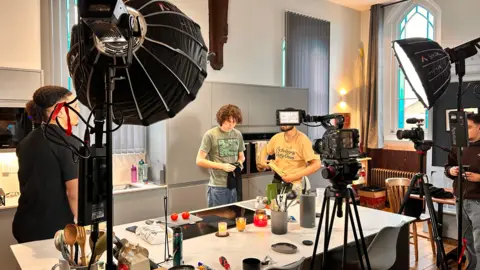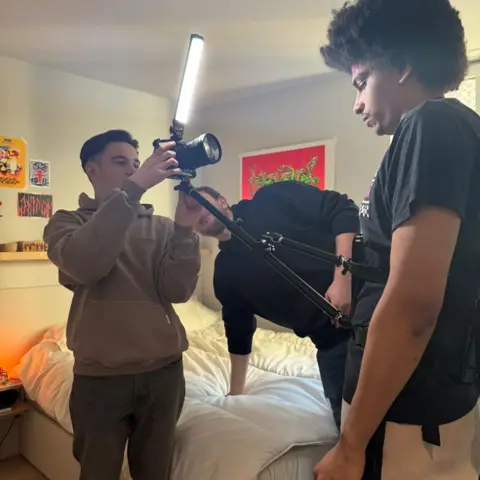Uni life 'like any other' despite brain cancer
 One in Two
One in TwoDavid Izekor was just 18 and in his first year at the University of Leeds when his life took an unexpected turn.
One night in 2021, he woke up feeling unwell.
The next thing he remembers is waking up in a hospital bed, being told he had suffered a haemorrhagic stroke, a bleeding in the brain by the rupture of a blood vessel.
The east Londoner had to undergo an emergency operation and was told he had a rare form of brain cancer, glioblastoma multiforme (GBM).
Four years on, the film student has made a documentary sharing his experience. He hopes it "springboards conversations in schools or to other cancer groups to share that a diagnosis doesn't mean the end".
Ten-hour awake operation
Apart from being at university during the Covid pandemic, Mr Izekor says his life had been like any other fresher's.
On the night he ended up in hospital, he says he doesn't remember anything, but his flatmate said he asked for some milk, which he then poured all over the kitchen floor in a delirium.
"Then I woke up in hospital, a doctor was telling me I had a brain aneurism. I knew something wasn't right," says Mr Izekor.
He was referred to a London hospital as doctors tried to find out what was causing the aneurism.
"Then doctors attended a big meeting to discuss my future, without me present, there was lots of big words used so I had to go to Google and find things out - which is really scary," he says.
"I received a call in the middle of the night one night. I had to have an emergency ten-hour awake operation on my brain because they'd found something in my head - so they needed to do a biopsy."
Glioblastomas affect more than 3,000 people per year in the UK, with an average prognosis of 12 to 18 months, according to The Brain Tumour Charity.
 One in Two
One in TwoAs a film student, Mr Izekor found a unique way to process his diagnosis - by documenting his journey through the lens of a camera.
From his hospital bed, he began creating TikTok videos.
"I was told 'my life is a movie' and I wanted to develop that idea," he says.
"Through sharing my journey, I have had so many people share their own stories - even things like how to speak to family members about what you're going through."
What began as short clips evolved into a full-length documentary titled One in Two, co-produced with his university flatmate and close friend, George Child.
The film captures not only his personal experience but also the stories of others affected by glioblastoma.
 One in Two
One in Two"In the making of my documentary I met lots of other families.
"One family I filmed with, a young girl had the same cancer as me and unfortunately died. Her parents have been really supportive," says Mr Izekor.
"I'm hoping that this springboards conversations in schools or to other cancer groups - to share that a diagnosis doesn't mean the end.
"Your life will change, but there can be positives and I want to share that."
Listen to the best of BBC Radio London on Sounds and follow BBC London on Facebook, X and Instagram. Send your story ideas to [email protected]
